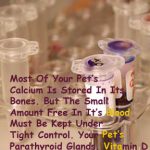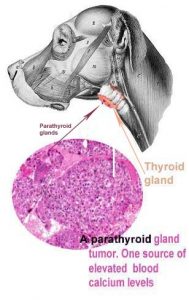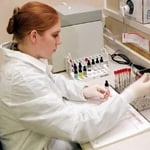Ron Hines DVM PhD
 See What Normal Blood & Urine Values Are
See What Normal Blood & Urine Values Are
 Causes Of Most Abnormal Blood & Urine Tests
Causes Of Most Abnormal Blood & Urine Tests
 Read more about the important part blood calcium plays in your dog and cat’s health here
Read more about the important part blood calcium plays in your dog and cat’s health here
Your Pet’s Blood Ionized Calcium Level = Free, Available & Unbound Calcium = iCa
Traditionally, veterinarians considered your pet’s blood calcium level as a single entity (unit or value). But it actually consists of three portions, ionized available free calcium (about half the total blood calcium), bound, unavailable, calcium (tied to your pet’s blood albumin and globulin 40-45%) and complexed calcium tied to blood anions (about 5-10%).
The free portion in the blood is the portion that is active and available at the pet’s cellular level. That is why measuring that portion separately is a better indication of the seriousness of the situation when total blood calcium is either high or low. Unlike total calcium level, ionized calcium is not affected by changes in your pet’s blood albumin levels.
Of course, the largest amount of calcium by far, in your pet’s body, remains unmeasured by blood tests – it is in its bones.
Veterinarians now feel that relying on your pet’s total blood calcium level to judge it current situation overestimates the number of pets that are truly hypercalcemic (high Ca) and under-estimates the number that are hypocalcemic (low Ca). That is why a supplemental ionized blood calcium determination might be advisable when your pet is ill.
Reasons Why The Ionized Portion Of Your Dog Or Cat’s Blood Calcium Might Be Low While Its Total Blood Calcium Level Remain Normal:
In chronic kidney failure, your pet’s total blood calcium value may still be within the normal range. Your pet’s kidneys are responsible for producing the active form of vitamin D. It is called calcitriol (1,25-dihydroxycholecalciferol or 1,25-dihydroxyvitamin D3).
Damaged kidneys may not produce adequate amounts of calcitriol. Without enough, it is primarily the ionized portion of your pet’s blood calcium that drops. In these situations, the pet’s parathyroid glands over-produce a hormone (PTH) that causes bone throughout the body to lose calcium (secondary hyperparathyroidism). Those pets often benefit from calcitriol supplements or injections (Calcijex®) and oral phosphorus binders. (read here)
Reasons Why The Free or Ionized Portion Of Your Pet’s Blood Calcium Might Be High:
In older pets, various forms of cancer are the most common cause.
Over-active parathyroid glands (hyperparathyroidism), vitamin D overdose and exposure to certain rodent poisons all elevate free blood calcium levels. (see my general article on high blood calcium)
Free calcium levels are often high in growing young dogs of the larger and giant breeds.
Certain granulomatous infections (e.g. blastomycosis) are rarer causes of high free blood calcium levels.
Reasons Why Your Pet’s Total Blood Calcium Level Might Be Increased While its Ionized Calcium Level Remained Normal:
This can also be an effect of chronic kidney disease. It appears that that increase is due to an increase in the complexed calcium portion. But there is no need to treat the elevated total blood calcium (hypercalcemia) because the active, ionized portion of blood calcium is still normal.
Reasons The Ionized Portion Of Your Pet’s Blood Calcium Might Be Normal While Your Pet’s Total Blood Calcium Level Remains High:
That is also sometimes the case in kidney failure and in Addison’s disease.
Reasons Both The Ionized Portion Of Your Pet’s Blood Calcium Level And The Bound Portion Levels Might Be High:
Acidosis (= decreased body pH) increases ionized calcium.
A lipemic or hemolyzed blood sample or a dehydrated pet can also be the cause.
Thyroxine supplement, given to hypothyroid pets, can also increase its level of ionized calcium.
Reasons Both The Ionized Portion Of Your Pet’s Blood Calcium Level And The Bound Levels Might Be Low:
Malnutrition, a very low calcium diet or administration of phosphate binders to pets in kidney failure can all have that effect.
A vitamin D3 deficiency or a low blood albumin level have both been known to cause that as well.
Alkalosis (an increased body pH) will decrease ionized calcium blood levels.
Test Availability
The ionized or free calcium assay is considerably harder to perform than a simple total blood calcium determination. Ionized calcium is quite unstable. So samples that have been stored or delayed in transit can give inaccurate results. Freezing and refrigeration can change the pH of blood samples causing the ionized calcium reading to be falsely low or high, respectively. Protecting the sample from air (anaerobic collection) is also desirable to maintain accuracy. Some diagnostic laboratories feel they have overcome those problems (Michigan State).
Complementary Tests:
CBC and complete blood chemistry panel including blood albumin levels, PTH hormone level, urinalysis, ACTH stimulation test, electrocardiogram for arrhythmias (=heartbeat abnormalities), tests suggested earlier for low or high total blood calcium level (hypocalcemia/hypercalcemia) 25-hydroxyvitamin D assay if rodent poison or other toxin ingestion or a Vitamin D deficiency is suspected
DxMe
You are on the Vetspace animal health website
Visiting the products that you see displayed on this website help pay the cost of keeping these articles on the Internet.


